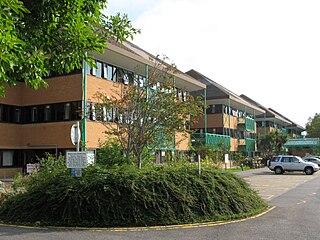
The National Institute for Health and Care Excellence (NICE) is an executive non-departmental public body, in England, of the Department of Health and Social Care, that publishes guidelines in four areas:

Two-tier healthcare is a situation in which a basic government-provided healthcare system provides basic care, and a secondary tier of care exists for those who can pay for additional, better quality or faster access. Most countries have both publicly and privately funded healthcare, but the degree to which it creates a quality differential depends on the way the two systems are managed, funded, and regulated.

The Norfolk and Norwich University Hospital (NNUH) is a large National Health Service academic teaching hospital in the Norwich Research Park on the western outskirts of Norwich, England.

Weston General Hospital is an NHS district general hospital in the town of Weston-super-Mare, Somerset, England, operated by University Hospitals Bristol and Weston NHS Foundation Trust. As of June 2019, the hospital had 261 beds and around 1,800 clinical and non-clinical staff. It has a part-time Accident & Emergency department, an intensive care unit, an oncology and haematology day unit, and a day case unit. The hospital also has a 12-bed private unit, The Waterside Suite, wholly owned by the hospital trust, with profits being re-invested into the main hospital.

Queen Elizabeth Hospital is a hospital in Woolwich in the Royal Borough of Greenwich. It was opened in March 2001 and serves patients from the Royal Borough of Greenwich and the London Borough of Bexley. The hospital was built to accommodate the services previously provided at Greenwich District Hospital and Brook General Hospital, and is a Private Finance Initiative hospital. It is managed by the Lewisham and Greenwich NHS Trust.

NHS Scotland, sometimes styled NHSScotland, is the publicly–funded healthcare system in Scotland and one of the four systems that make up the National Health Service in the United Kingdom. It operates 14 territorial NHS boards across Scotland, supported by seven special non-geographic health boards, and Public Health Scotland.

Alder Hey Children's Hospital is a children's hospital and NHS foundation trust in West Derby, Liverpool, England. It is one of the largest children's hospitals in the United Kingdom, and one of several specialist hospitals within the Liverpool City Region, alongside the Royal Liverpool University Hospital, Liverpool Women's Hospital, Liverpool Heart and Chest Hospital, the Walton Centre, Mersey Regional Burns and Plastic Surgery Unit, and Clatterbridge Cancer Centre.

The East of England Ambulance Service NHS Trust (EEAST) is an NHS trust responsible for providing National Health Service (NHS) ambulance services in the counties of Bedfordshire, Cambridgeshire, Essex, Hertfordshire, Norfolk and Suffolk, in the East of England region. These consist of approximately 6.2 million people across an area of 7,500 square miles (19,000 km2).
The Sheffield Teaching Hospitals NHS Foundation Trust is a combined acute and community NHS foundation trust in Sheffield, England. Founded in 2001 and awarded foundation status in 2004, the trust covers most of Sheffield's adult community services, two major adult hospitals, the Northern General Hospital and the Royal Hallamshire Hospital, as well as the specialised Charles Clifford Dental, Jessop Wing and Weston Park hospitals. The chief executive of the trust is Kirsten Major, the chief nurse is Chris Morley, the medical director for operations is Jennifer Hill, and the medical director for strategy and development is David Black.

University Hospital Coventry is a large National Health Service (NHS) hospital situated in the Walsgrave on Sowe area of Coventry, West Midlands, England, 4 miles (6 km) north-east of the city centre. It is part of the University Hospitals Coventry and Warwickshire NHS Trust, and is the principal hospital serving Coventry and Rugby, providing a wide range of services. It works in partnership with the University of Warwick's Warwick Medical School. It has a large, progressive accident & emergency department providing a trauma service to Coventry and Warwickshire.

Emergency medical services in the United Kingdom provide emergency care to people with acute illness or injury and are predominantly provided free at the point of use by the four National Health Services (NHS) of England, Scotland, Wales, and Northern Ireland. Emergency care including ambulance and emergency department treatment is only free to UK residents and a charge may be made to those not entitled to free NHS care.

Healthcare in the United Kingdom is a devolved matter, with England, Northern Ireland, Scotland and Wales each having their own systems of publicly funded healthcare, funded by and accountable to separate governments and parliaments, together with smaller private sector and voluntary provision. As a result of each country having different policies and priorities, a variety of differences have developed between these systems since devolution.

The National Health Service (NHS) is the publicly funded healthcare system in England, and one of the four National Health Service systems in the United Kingdom. It is the second largest single-payer healthcare system in the world after the Brazilian Sistema Único de Saúde. Primarily funded by the government from general taxation, and overseen by the Department of Health and Social Care, the NHS provides healthcare to all legal English residents and residents from other regions of the UK, with most services free at the point of use for most people. The NHS also conducts research through the National Institute for Health and Care Research (NIHR).
Healthcare in England is mainly provided by the National Health Service (NHS), a public body that provides healthcare to all permanent residents in England, that is free at the point of use. The body is one of four forming the UK National Health Service as health is a devolved matter; there are differences with the provisions for healthcare elsewhere in the United Kingdom, and in England it is overseen by NHS England. Though the public system dominates healthcare provision in England, private health care and a wide variety of alternative and complementary treatments are available for those willing and able to pay.
Health care rationing refers to mechanisms that are used for resource allocation in health care.
Circle Health Group is a private healthcare provider in the United Kingdom, and is the country's biggest private hospital provider. The company was founded in 2004 and rebranded as Circle Health Group in 2019 after acquiring a rival, BMI Healthcare; in the same year it began an expansion in China. In 2023 the company was acquired by an Abu Dhabi-based holding company called PureHealth.
The Royal Cornwall Hospitals NHS Trust is an NHS trust which runs West Cornwall Hospital, St Michael's Hospital, Royal Cornwall Hospital, and St Austell Hospital - Penrice Birthing Unit, in Cornwall, England.
Moorfields Eye Hospital NHS Foundation Trust is an NHS foundation trust which runs Moorfields Eye Hospital.
Sir Robert Anthony Francis, KC is a British barrister. He specialises in medical law, including medical and mental health treatment and capacity issues, clinical negligence and professional discipline. He has appeared as a barrister for and chaired several high-profile inquiries into medical controversies/scandals.

Private healthcare in the UK, where universal state-funded healthcare is provided by the National Health Service, is a niche market.














